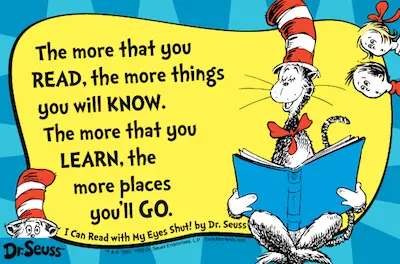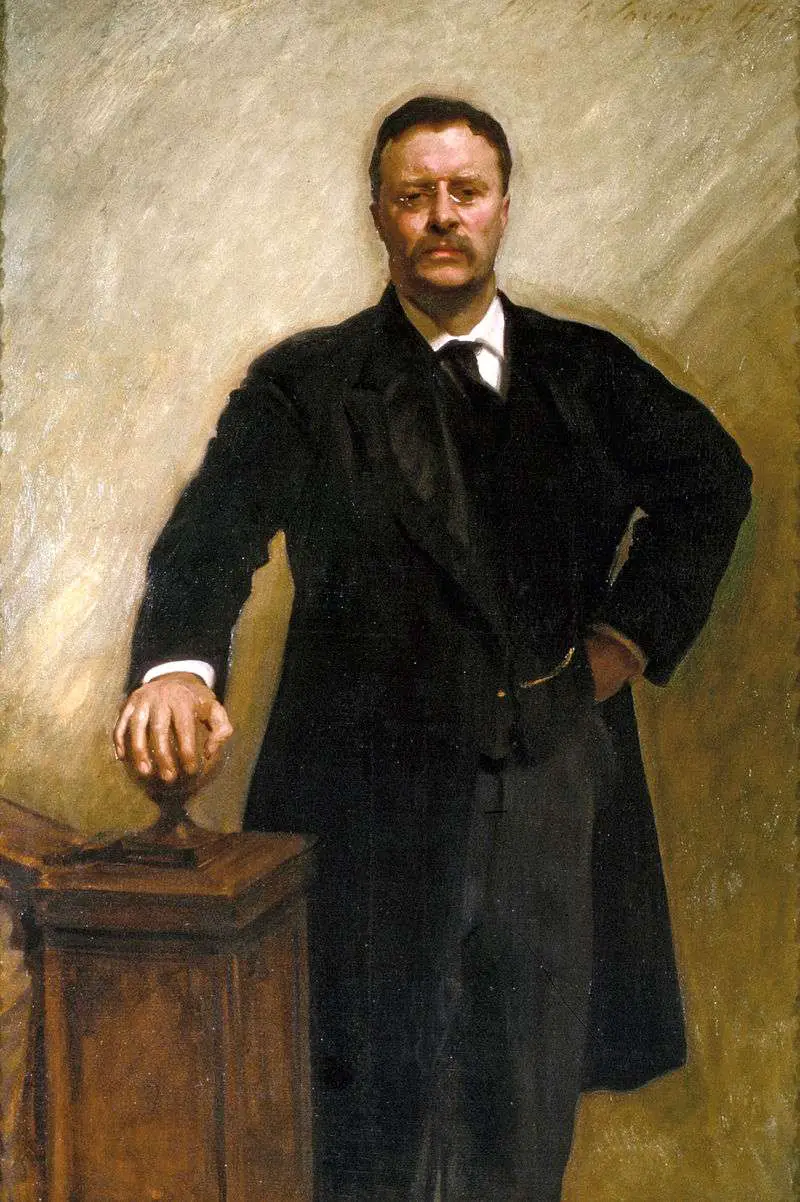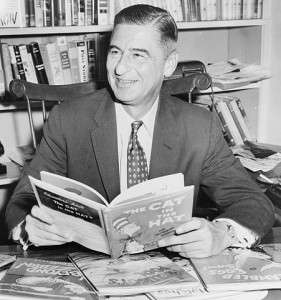Dr. Seuss lived much of his life in California and New York, but never really left Springfield, Mass., where he was born on March 2, 1904.
 The timeless children’s books of Theodor Seuss Geisel originated from his boyhood in the western Massachusetts city. Themes and images from his 46 imaginative children’s books can be traced to Springfield: Mulberry Street, the McElligot family, his father’s Rube Goldberg inventions, the haunted house next door, colorful Victorian homes, the wild animals in the Springfield Zoo he could hear at night. In How the Grinch Stole Christmas, the town of Whoville is based on Easthampton, Mass., just north of Springfield, and the Grinch’s mountain is based on Mount Tom nearby.
The timeless children’s books of Theodor Seuss Geisel originated from his boyhood in the western Massachusetts city. Themes and images from his 46 imaginative children’s books can be traced to Springfield: Mulberry Street, the McElligot family, his father’s Rube Goldberg inventions, the haunted house next door, colorful Victorian homes, the wild animals in the Springfield Zoo he could hear at night. In How the Grinch Stole Christmas, the town of Whoville is based on Easthampton, Mass., just north of Springfield, and the Grinch’s mountain is based on Mount Tom nearby.
Something happened to him in Springfield, too, that would remain with him for the rest of his life.
Geisel’s family belonged to Springfield’s prosperous German community in Springfield, which became the object of suspicion when World War I broke out. German frankfurters became hot dogs and sauerkraut became liberty cabbage.
Boy Scouts
Young Ted Geisel belonged to Boy Scout Troop 13, which undertook a war bond drive. He walked from house to house selling war bonds. His grandfather, a well-to-do brewer, bought $1,000 worth of bonds from his grandson. That made Ted one of the top-selling Scouts in Springfield.
Ted and nine other Scouts were to receive an award from former President Theodore Roosevelt in May 1918. They lined up on the state of Springfield’s Municipal Auditorium awaiting their award. Ted was last.
Roosevelt handed each boy an award – and then he got to Ted. Someone had made a mistake and given the former president only nine awards. It was an embarrassing situation, and Roosevelt made it worse. “What’s this boy doing here?” he said loudly. Ted, mortified, was hustled off the stage.
From then on, fear of appearing before an audience became a phobia with Ted Geisel. His biographer Thomas Fensch suggests he moved to a lonely mountaintop in La Jolla, Calif., to avoid crowds and the possibility of a neighbor asking “What’s he doing here?”
(One also wonders if the incident didn’t inspire his comment, “A person’s a person, no matter how small.”)
Dr. Seuss Grows Up
 Dr. Seuss would succeed as a commercial illustrator and as a children’s book author. In 1954, Life magazine published a study on childhood illiteracy, concluding that children weren’t learning to read because their books were so boring. A publisher at Houghton Mifflin compiled a list of 348 words it was important for children to recognize. He cut it down to 250 and challenged Geisel to write a book using just those words – a book children couldn’t put down. Dr. Seuss rose to the challenge and wrote The Cat in the Hat. It is still, of course, in print.
Dr. Seuss would succeed as a commercial illustrator and as a children’s book author. In 1954, Life magazine published a study on childhood illiteracy, concluding that children weren’t learning to read because their books were so boring. A publisher at Houghton Mifflin compiled a list of 348 words it was important for children to recognize. He cut it down to 250 and challenged Geisel to write a book using just those words – a book children couldn’t put down. Dr. Seuss rose to the challenge and wrote The Cat in the Hat. It is still, of course, in print.
Dr. Seuss died on Sept. 24, 1991. His birthday has been adopted as the annual date for National Read Across America Day.
With thanks to The Man Who Was Dr. Seuss: The Life and Work of Theodor Geisel by Thomas Fensch. Dr. Seuss cartoon by By Greg Williams – Own work, CC BY-SA 2.5, https://commons.wikimedia.org/w/index.php?curid=2265954. This story was updated in 2024. Springfield Public School By Leepaxton at en.wikipedia, CC BY-SA 4.0, https://commons.wikimedia.org/w/index.php?curid=16996541.



30 comments
What an embarrassing time for the young boy but how great that he went on to write his children’s books.
And the more go, you’ll put on your hat,
You’ll look just great, it’s as simple as that!!
shared!
[…] It was conceived in 1966, when animator Chuck Jones of Bugs Bunny fame called up his old Army buddy Theodor Geisel – aka Dr. Seuss. Jones suggested they adapt one of his books for TV. Geisel said no. Geisel’s […]
[…] loudly. Ted, mortified, was hustled off the stage” (Teddy Roosevelt Humiliates Dr. Seuss, https://newenglandhistoricalsociety.com/teddy-roosevelt-humiliates-dr-seuss/, […]
[…] Jan. 18, 1903, his South Wellfleet station sent a greeting from President Theodore Roosevelt to King Edward VII of the United Kingdom. It was the first radio transmission to cross the Atlantic […]
[…] Texas, was accused of rioting. No infantryman testified against his comrades, but President Theodore Roosevelt dismissed the entire division with a dishonorable discharge. Sen. Morgan Bulkeley was one of the […]
[…] at the White House. They had an unusual flavor because the chicken yard was built on top of Theodore Roosevelt’s mint […]
[…] 1902, Teddy Roosevelt’s renovation and expansion of the White House took out a load-bearing wall. And in 1927, Calvin […]
[…] the rest of his life, Seuss had a fear of crowds. Later in life, he lived in isolation on a mountain top. He skipped his speaking engagements, terrified of being publicly humiliated the way he was as a […]
[…] the rest of his life, Seuss had a fear of crowds. Later in life, he lived in isolation on a mountain top. He skipped his speaking engagements, terrified of being publicly humiliated the way he was as a […]
[…] to lower his quality, closed his lithographic factory and moved to Springfield, Mass., which had a large German population. He continued to produce high-quality work and made child-safe art materials. The American Crayon […]
[…] the rest of his life, Seuss had a fear of crowds. Later in life, he lived in isolation on a mountain top. He skipped his speaking engagements, terrified of being publicly humiliated the way he was as a […]
[…] his father, Joseph P. Kennedy, worked for Franklin D. Roosevelt, whose wife's uncle Teddy Roosevelt had been president of the United States eight years […]
[…] Kohn, in Hot Time in the Old Town credits the heat wave with shaping Theodore Roosevelt’s political career as governor of New York and president of the United States. Roosevelt was a […]
[…] the rest of his life, Seuss had a fear of crowds. Later in life, he lived in isolation on a mountain top. He skipped his speaking engagements, terrified of being publicly humiliated the way he was as a […]
[…] by 12.5 percent. In 1903, Mother Jones led a march of mill children from Philadelphia to President Theodore Roosevelt’s summer home in Oyster Bay. And Hartford newsboys went on strike in […]
[…] drama paled in comparison to the 1904 scandal. The Boston Herald, an opponent of President Theodore Roosevelt, reported his children had cruelly treated the turkey sent by Horace […]
[…] closed his lithographic factory and moved to Springfield, Mass., which had a large German population. He continued to produce high-quality work and made child-safe art materials. The American Crayon […]
[…] of 1891, James Naismith had a problem with his class of physical education students at the Springfield, Mass., YMCA. The boys, sick of being cooped up inside, acted rowdy and on edge. Dr. Luther Gulick, […]
[…] considered the ‘most formidable racer’ in America. He was called the Worcester Whirlwind, and President Theodore Roosevelt was one of his biggest […]
[…] law book. The only other president known to have taken the oath of office without a Bible present? Teddy Roosevelt, sworn in after the assassination of William McKinley. However, for several inaugurations no […]
[…] Dr. Seuss was humiliated by Theodore Roosevelt when he was a kid during an award ceremony, resulting in Dr. Seuss fearing large crowds for the rest of his life.. Ref: http://www.newenglandhistoricalsociety.com/teddy-roosevelt-humiliates-dr-seuss/ […]
[…] Teddy Roosevelt rose to the presidency of the United States at the young age of 42. His political career skyrocketed from the time he charged up San Juan Hill during the Spanish-American War. He rode that success to win election as governor of New York. […]
[…] closed his lithographic factory and moved to Springfield, Mass., which had a large German population. He continued to produce high-quality work and made child-safe art […]
[…] from the U.S. Army. Frank Capra, who directed It’s a Wonderful Life, dreamed up Private Snafu. Dr. Seuss was joined by such giants of animation as Chuck Jones, Mel Blanc and Bugs Bunny creator Fritz […]
[…] his father, Joseph P. Kennedy, worked for Franklin D. Roosevelt, whose wife’s uncle Teddy Roosevelt had served as president of the United States eight years […]
[…] the top scouts were invited to receive an award from President Theodore Roosevelt at the Springfield Municipal Auditorium and so he lined up on the day, ready to accept his […]
[…] the top scouts were invited to receive an award from President Theodore Roosevelt at the Springfield Municipal Auditorium and so he lined up on the day, ready to accept his […]
[…] the top scouts were invited to receive an award from President Theodore Roosevelt at the Springfield Municipal Auditorium and so he lined up on the day, ready to accept his […]
Comments are closed.